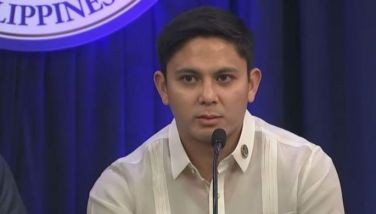All Metro mayors back shift to GCQ

MANILA, Philippines — All the 17 Metro Manila mayors yesterday voted in favor of shifting the coronavirus disease 2019 (COVID-19) restrictions in the nation’s capital from modified enhanced community quarantine (MECQ) to general community quarantine (GCQ) starting June 1.
Metro Manila Development Authority (MMDA) general manager Jojo Garcia announced this after a meeting of the Metro Manila Council.
Under GCQ, however, mayors will still have the mandate to impose lockdowns in certain barangays or areas where there are several cases of COVID-19.
The development came as the government is poised to decide today whether to relax the restrictions in Metro Manila, which has been under community quarantine since March.
Members of the Inter-Agency Task Force (IATF) on Emerging Infectious Diseases are set to meet to discuss the COVID-19 situation in the country.
“Let’s wait for the decision of the IATF because by tomorrow, they may come up with a decision,” presidential spokesman Harry Roque said in Filipino at a press briefing yesterday.
“What is important is that we will look at the doubling rate and the critical care capacity and, of course, we will pay attention to our economy,” Roque added.
Religious leaders were scheduled to meet with officials yesterday to discuss protocols for religious gatherings.
Filipinos, according to the Palace spokesman, should get used to social distancing because of the risks posed by the virus.
“We need to adjust to a new lifestyle... Even if we are under MGCQ or the ‘new normal,’ social distancing is already part of our life. All activities will have to observe social distancing. Well, the future of these events (and) industries will really depend on our ability to adopt to a new lifestyle,” he said.
Metro Manila, Laguna, Bataan, Bulacan, Nueva Ecija, Pampanga, Zambales and Angeles City have been placed under modified enhanced community quarantine, a transition between the strictest ECQ and GCQ.
Only Cebu City and Mandaue City in the Visayas remain under ECQ, while the rest of the country is now under GCQ.
Roque had earlier said Metro Manila – home to more than 12 million people and contributor of more than a third of the Philippines’ economy – may shift to the more lenient GCQ if the spread of coronavirus slows down and if its capacity to provide critical healthcare improves.
“If the data showed a slower doubling time of COVID cases and if the critical care capacity is increased, that’s possible. But let’s wait for the formal announcement of the IATF,” Roque told radio dzRH last Monday.
Under ECQ, public transportation is suspended and only essential industries like those involved in healthcare and food production can operate.
Some industries are allowed to operate partially in MECQ areas, although mass transportation is still prohibited.
Public transportation may resume operations in GCQ areas, but at a reduced capacity to observe safe physical distancing.
More establishments are allowed to reopen under GCQ, but they should follow health standards and social distancing.
In another interview, Roque said some “changes” may happen in Metro Manila soon, but did not elaborate.
“The IATF has not met to discuss (the quarantine scenario in Metro Manila)... But if you notice the trend, you look at the doubling rate of COVID-19 and the increase in critical care capacity and, of course, the fact that we need to reopen the economy,” he told radio dzBB.
“So I think there would be changes in the system being implemented in Metro Manila but I do not want to preempt the IATF,” he added.
Defense Secretary Delfin Lorenzana had earlier said Metro Manila may be placed under GCQ in June, citing what he described as “encouraging” signs like single digit increase in deaths and increasing recoveries.
Last week, Carlito Galvez Jr., chief implementer of the national policy on COVID-19, said the government may limit lockdowns to barangays or villages with COVID-19 cases to lessen the effects of the disease on the economy.
Possible GCQ
Interior and Local Government Secretary Eduardo Año yesterday said Metro Manila and other areas under MECQ may soon transition to the less stringent GCQ.
Año said Duterte would decide tomorrow or on Friday whether to extend the MECQ, which is scheduled to end on May 31.
Año said they are also waiting for the recommendation of the Metro Manila Council (MMC) on whether the region is ripe for GCQ to allow more economic activity.
He, however, reminded the public that health and safety protocols such as police checkpoints will remain in place for as long as there is no vaccine for COVID-19.
“As long as there is still no vaccine, maybe, up to the end of the year, or maybe up to 2021, this is how our life will be,” he said.
There are about 4,000 police checkpoints in the country, according to Año, and these will be modified to prevent traffic congestion.
“Spot checkpoints will be set up. It means traffic flow will be eased, but at the same time, we are still able to implement it at random,” he said.
The interior chief added that local government units (LGUs) can impose their own lockdowns of barangays, neighborhoods or subdivisions with high COVID cases.
He likened it to surgical operations, as only certain areas with at least 20 COVID-19 cases will be closed to prevent the virus from spreading.
Areas without cases, called buffer zones, will stay open for business.
“I think that is a better setup because our economy is able to breathe,” Año said.
Military frontliners lauded
Armed Forces of the Philippines (AFP) chief Gen. Felimon Santos Jr. yesterday lauded military frontline workers for their dedication and service in manning the four COVID-19 mega facilities in Metro Manila.
“The AFP takes pride in our military doctors, nurses medical aid, support and security personnel who continue to operate and stand their ground in the battle against the COVID-19 pandemic. They remain dedicated to their duties, risking their own well-being to ensure the safety of Filipinos affected by the dreaded disease,” Santos said.
As one of the lead agencies in combatting COVID-19, the AFP was tasked to provide manpower for clinical and operational support to Mega Temporary Treatment and Monitoring Facilities and swabbing centers in the country.
Some 382 composite military doctors, nurses, support, medical aid and security personnel are currently deployed to facilities at the World Trade Center, Ninoy Aquino Stadium, Rizal Memorial Coliseum and Enderun Mega Swabbing Center.
“The COVID-19 pandemic is an enemy that requires a different form of sacrifice, commitment and dedication. While our enemy is unseen and cannot be eliminated by anything in our armory, our greatest asset has been and will always be our people,” Santos said.
“Our duty to the nation transcends all threats, and we in the Armed Forces of the Philippines are capable of fulfilling our mandate to protect the people from all kinds of threats,” he added. Christina Mendez, Emmanuel Tupas, Michael Punongbayan
- Latest
- Trending




























